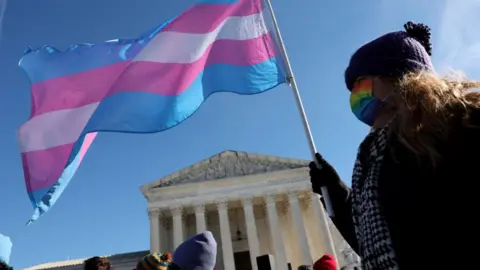US Supreme Court allows Trump to enforce transgender military ban
6 May 2025Share
Save
Kayla Epstein
BBC News

A protester supporting transgender rights outside the US Supreme Court
The US Supreme Court temporarily allowed President Donald Trump to enforce his ban on transgender people serving in the military while legal challenges to the policy move forward.
Shortly after taking office in January, Trump signed a pair of executive orders that enabled the Pentagon to implement the ban.
But a lower federal court blocked the policy in March, ruling that the administration had failed to provide evidence that transgender troops posed a threat to military effectiveness.
In an emergency application to the court, the Trump administration argued that the lower court should show deference to the military's judgement in matters of national defence.
The court's three liberal justices objected to the stay, which arrived via an unsigned order on Tuesday.
Trump's executive order declared that identifying as transgender "conflicts with a soldier's commitment to an honourable, truthful, and disciplined lifestyle" and would hamper military preparedness.
In February, the Department of Defense announced it would begin discharging currently serving transgender personnel.
Seven servicemembers, including Commander Emily Schilling, a Navy fighter pilot, swiftly challenged the ban, along with a transgender individual seeking to enlist.
The plaintiffs argued that the ban "undermines military readiness, endangers our safety, and violates the United States Constitution"."
"Today's Supreme Court ruling is a devastating blow to transgender servicemembers who have demonstrated their capabilities and commitment to our nation's defense," Lambda Legal and the Human Rights Campaign Foundation, which are representing the plaintiffs, said in a joint statement.
"By allowing this discriminatory ban to take effect while our challenge continues, the Court has temporarily sanctioned a policy that has nothing to do with military readiness and everything to do with prejudice," it said.
In March, a federal judge in Washington state ordered a nationwide halt on the administration's ban, saying the government failed to show it would enhance "unit cohesion, good order or discipline".
The Ninth Circuit Court of Appeals did not block the lower court's ruling, keeping the injunction in place.
With the Supreme Court order, that pause will lift while the servicemembers' lawsuit makes its way through lower courts.
White House spokesperson Karoline Leavitt called the order "another massive victory in the Supreme Court.
